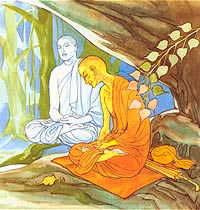29912 Saturday LESSON 712 FREE ONLINE eNālāndā Research and Practice UNIVERSITY through http://sarvajan.ambedkar.org-
Dhammapada Verse 367 Pancaggadayaka Brahmana
Vatthu-He Is A Monk Who Has No Attachment
Verse 367. He Is A Monk Who Has No Attachment
For whom there is no making ‘mine’
towards all name and form,
who does not grieve for what is not,
he’s truly ‘bhikkhu’ called.
Explanation: He has gone beyond all sense of his own name
and form. To him, there is no existence of I, my or mine. If his name
and form entity were to decay and deteriorate, he will not grieve.
Such a person is called a monk.
Dhammapada Verse 367
Pancaggadayaka Brahmana
VatthuSabbaso namarupasmim
yassa natthi mamayitam
asata ca na socati
sa ve “bhikkhu” ti vuccati.Verse 367: He who does not take the
mind-and-body aggregate (nama-rupa) as “I and mine”, and who does not
grieve over the dissolution (of mind and body) is, indeed, called a bhikkhu.
The Story of the Giver of the First-Fruits of His Labour
While residing at the Jetavana
monastery, the Buddha uttered Verse (367) of this book, with reference to a
brahmin who was in the habit of making five offerings of first-fruits in
charity. The first-fruits here refer to the first-fruits of the field. The
first-fruits of the field are given in charity at the time of harvesting, at the
time of threshing, at the time of storing, at the time of cooking and at the
time of filling the plate.One day, the Buddha saw the
brahmin and his wife in his vision and knew that time was ripe for the couple to
attain Anagami Fruition. Accordingly, the Buddha set out for their house and
stood at the door for alms food. The brahmin who was then having his meal,
facing the interior part of the house, did not see the Buddha. His wife who was
near him saw the Buddha, but she was afraid that if her husband saw the Buddha
standing at the door for alms-food, he would offer all his rice in the plate
and, in that case, she would have to cook again. With this thought in her mind,
she stood behind her husband so that he would not see the Buddha; when she
quietly stepped backwards and slowly came to where the Buddha was standing, and
whispered to him, “Venerable Sir! We do not have any alms-food for you
today.” But the Buddha had decided not to leave the house; he just
shook his head. Seeing this gesture, the brahmin’s wife could not control
herself and she burst out laughing.At that instant, the brahmin
turned round and saw the Buddha. At once he knew what his wife had done, and he
cried out, “O you, my wretched wife! You have ruined me.” Then, taking
up his plate of rice, he approached the Buddha and apologetically requested,
“Venerable Sir! Please accept this rice which I have partly consumed.”
To him the Buddha replied, “O brahmin! Any rice is suitable for me,
whether it is not yet consumed, or is partly consumed, or even if it is the last
remaining spoonful.” The brahmin was very much surprised by the
Buddha’s reply; at the same time, it made him happy because his offer of rice
was accepted by the Buddha. The brahmin next asked the Buddha by what standard a
bhikkhu was judged and how a bhikkhu was defined. The Buddha knew that both the
brahmin and his wife had already learned something about mind and body (nama-rupa);
so he answered, “O brahmin! One who is not attached to mind and body is
called a bhikkhu.”Then the Buddha spoke in verse as
follows:
Verse 367: He who does
not take the mind-and-body aggregate (nama-rupa) as “I and
mine”, and who does not grieve over the dissolution (of mind and
body) is, indeed, called a bhikkhu.At the end of the discourse both
the brahmin and his wife attained Anagami Fruition.Please visit:
http://www.innovativefilmcity.in/home.html
HANDICRAFT & CULTURAL VILLAGE
HANDICRAFT & CULTURAL VILLAGE is an ethnic market place which
will house souvenir and handicraft shops. It will provide vivid flavors
of Karnataka & other states of India. Let it be the Yakshagana
performance of Karnataka or the famous Chennapatna toy collection or the
Ragi muddas, this village place will offer an elaborate experience of
the rich culture, craftsmanship & food tastes of various States of
India, to national & international tourists
This Ethnic Village will provide an opportunity to the village crafts
and culture to be displayed, demonstrated and sold. Modern generation
will find a platform to get introduced to our Indian heritage and ethnic
tastes of food, costumes, handicrafts, music, etc
Being a unique and a distinguished concept it will create a new landmark
in Karnataka, which will be a pride for our State. This will be a
Tourism Wonder & an added tourist attraction in Karnataka.
Along with local & national tourists, handicraft market will be a
major attraction for foreign tourists who visit India to explore its
deep rooted cultural heritage and craftsmanship.
Events
Activities will commence from 30th September 2012 & continue
till 2nd January 2013.
11 States of India are invited to participate
Handicraft shops of the participating States will be set up during the
entire period of three months
Artisans from these States will get an opportunity to give live demo of
their craftsmanship to the visitors
Food shops selling food cuisines of each state will be set up
Specific State festivals will be celebrated during which Cultural
performances of the celebrated State will be organized throughout the
day culminating into special cultural event in the evening at the
amphitheatre.









